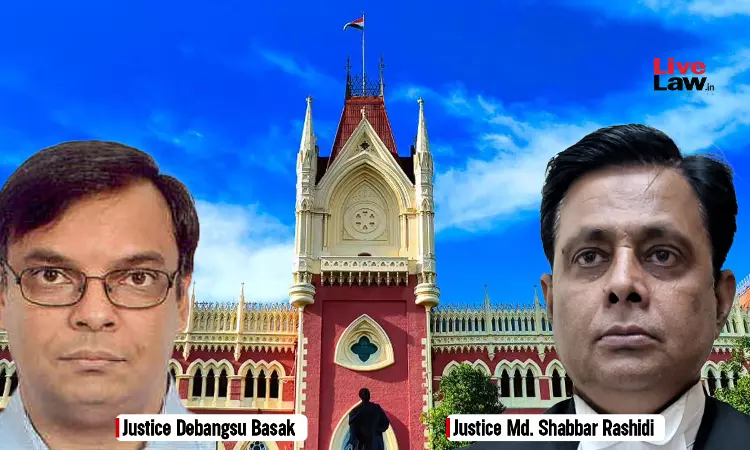- Home
- /
- High Courts
- /
- Calcutta High Court
- /
- Calcutta High Court Commutes Death...
Calcutta High Court Commutes Death Sentence Of Man Convicted For Beheading Lady Whom He Suspected To Be A 'Witch'
Srinjoy Das
28 July 2025 11:19 AM IST
The Calcutta High Court has commuted the death sentence of a man, who was convicted for beheading a lady over suspicions of her being a 'witch.'A division bench of Justices Debangsu Basak and Md Shabbar Rashidi held: "His overall conduct in the correctional home was found to be good. His age is also of consideration. Moreover, he had suffered a fall from the roof of bus resulting in his...
The Calcutta High Court has commuted the death sentence of a man, who was convicted for beheading a lady over suspicions of her being a 'witch.'
A division bench of Justices Debangsu Basak and Md Shabbar Rashidi held: "His overall conduct in the correctional home was found to be good. His age is also of consideration. Moreover, he had suffered a fall from the roof of bus resulting in his mental illness which often turns violent for which the family had to keep him detained...We are of the opinion that in the facts and circumstances of the present case, imprisonment for life would be sufficient punishment instead of death penalty. We are not minded to confirm the death sentence awarded by the learned trial court."
Background
Advocate for the appellant submitted that there are variations in the statements of the prosecution witnesses vis-à-vis the written complaint. It was also submitted on behalf of the Advocate for the appellant that the prosecution witnesses, particularly, P.W. 1 and P.W. 3, who claimed to be eye-witnesses to the incident, were highly doubtful as there were material contradictions in the statements of such witnesses.
Counsel submitted that no independent witnesses have been examined on behalf of the prosecution as P.Ws 1 and 3 are relatives of the victim and are highly interested witnesses. Their testimonies should not be trusted to secure the conviction of the appellant.
It was also submitted that non-appearance or non-examination of any of the persons from the locality where it had been claimed that the incident occurred in an open space makes the case of the prosecution highly doubtful.
Counsel also submitted that the Trial Court did not assign any reason in the impugned judgment as to how he was left with no option but to award capital punishment. It was submitted that the Trial Court did not come to a definite conclusion that the case fell within the category of 'rarest of rare cases' and proceeded to award the punishment of death. There was no finding in the impugned judgment that the appellant was beyond reformation.
Counsel for the State submitted that the victim was dragged out of her residence and taken to some distance near a temple, where she was beheaded by the appellant. There were eyewitnesses to the incident. Besides that, the medical evidence also supports the case of the prosecution so far as the nature and manner of injury are concerned.
He further stated that the appellant took the victim near a Shiv temple in her village and chopped off her head with a sharp weapon. The de facto complainant further stated in her written complaint that after such an incident, the appellant returned to his house, dancing down the road carrying the head of the victim in one hand and a sharp cutting weapon in the other.
Court's reasoning
Court noted that from the evidence of the aforesaid witnesses, it was quite convincingly established that the victim was forcibly dragged out of her house and taken to the Kali temple. She was made to bow down, and the appellant struck her on the back of her neck with a sharp cutting weapon, resulting in the unnatural death of the victim.
However, during the course of the hearing of the appeal, the court had also called for a psychological, medical and socio-economic evaluation of the accused. From the reports, it was noted that the appellant is 28 years of age and is unmarried. He is the only son of his parents and has no sisters. He studied up to class V and thereafter worked as an agricultural labourer and helper of a mason.
The report also disclosed that the appellant once fell from the roof of a bus, and since then, he has developed a mental illness. He often went violent due to such illness. He used to be kept tied and was under medical treatment.
According to the socio-economic report, the court noted that the condition of the family is not very sound socially. The educational status of the family is also not very good. The family is poor and uneducated and is not in a position to understand the consequences. The report also indicated that the appellant has no criminal antecedents and his conduct in the correctional home was normal. He was found physically fit but mentally depressed.
Thus, in consideration of such reports and the binding precedents laid down by the Supreme Court, the court commuted the death sentence to life imprisonment.
Case: THE STATE OF WEST BENGAL Vs. RADHA KANTA BERA
Case No: DEATH REFERENCE NO. 02 OF 2023



